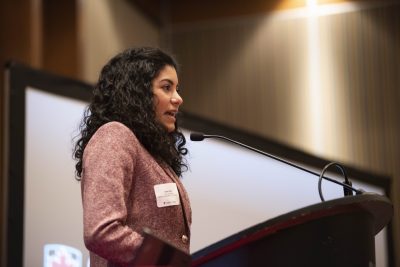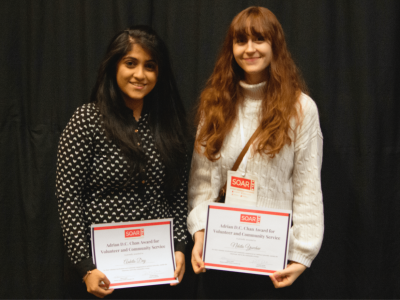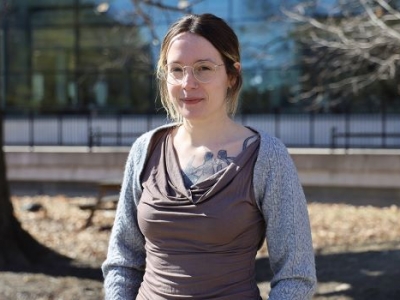“Women in STEM have a hard time finding role models and mentors. As a result, women may find it hard to imagine themselves in positions of influence and are prone to imposter syndrome. So being resilient and keeping our values in mind should be helpful to help us have the amazing careers that we deserve.”- Irem Bor-Yaliniz
 Irem Bor-Yaliniz was among 10 researchers appearing in the N2Women 2019 Rising Stars in Computer Networking and Communications. This prestigious list highlights the top 10 inspiring women for every year. Bor-Yaliniz is the first Canadian woman to have ever made it onto this list, let alone a Carleton student. It is rare for a PhD student to win this award, yet Bor-Yaliniz has achieved this.
Irem Bor-Yaliniz was among 10 researchers appearing in the N2Women 2019 Rising Stars in Computer Networking and Communications. This prestigious list highlights the top 10 inspiring women for every year. Bor-Yaliniz is the first Canadian woman to have ever made it onto this list, let alone a Carleton student. It is rare for a PhD student to win this award, yet Bor-Yaliniz has achieved this.
“I am greatly honored and humbled by being named as a rising star,” shared Bor-Yaliniz. “It gave me the assurance that all those sleepless nights and hard work were not in vain. It is also motivating to achieve more, work more, and contribute more to our society.”
N2Women (Networking Networking Women) is an initiative by the IEEE Communications Society, and it is supported by Google and the National Science Foundation, along with many others. IEEE is one of the world’s largest technical professional organizations dedicated to advancing technology for the benefit of humanity. N2Women aims to foster connections among under-represented women in this computing sub-field.
Bor-Yaliniz got involved with IEEE during her PhD studies as it provided her with volunteering opportunities as well as the chance to network with distinguished professionals from academia and industry.
Her research concerns answering the following question: How do we make next generations of wireless networks flexible and strong enough to support increasing capacity and availability demands? The PhD student came up with a pioneering answer: By utilizing drones as cell phone towers within the existing networks, i.e., 4G/LTE, and future generations, e.g., 5G.
“Mobility of drone cell towers have significant opportunities and challenges: Their mobility reduces the need to keep building cell towers, which are costly to build, maintain and operate,” explained Bor-Yaliniz. “We can use drone cell towers whenever, wherever and however needed. On the other hand, wireless networks are designed to cope with the mobility of users; not cell-towers. Therefore, we need to enhance the flexibility of the ground networks to support aerial networks, ensure that the aerial network is efficiently used, and the integration of aerial and ground nodes is seamless.”
Bor-Yaliniz’s publications have already received over 850 citations in just 2-3 years making them some of the most cited papers in the emerging area of non-terrestrial networks.
“It is absolutely amazing and humbling to see that our research is well received by our colleagues,” expressed Bor-Yaliniz. “Recently, two of our papers were voted best reads in this area by the IEEE Communication Society. During academic events, colleagues approach us to discuss our papers, and it gives me the opportunity to establish valuable collaborations.”
Huawei Ottawa Research Centre has recruited Bor-Yaliniz as a Senior Engineer.
“Working at Huawei means being part of an extremely talented and distinguished team,” said Bor-Yaliniz. “Everyone around me are role models, very knowledgeable, and hardworking. My job there is inspiring and challenging since it gives me the chance to make my research more real than imaginary by contributing to 5G standardization.”
Professor Halim Yanikomeroglu from the department of Systems and Computer Engineering has been supervising Bor-Yaliniz throughout her research.
“My supervisor, Prof. Halim Yanikomeroglu, is a world-renowned expert and inventor in wireless communications with 35 granted patents,” shared Bor-Yaliniz. “His vision planted the seeds of my research and guided it in the most fruitful directions. However, his help goes above and beyond that since he shares his advice and expertise generously at times of bottlenecks, and encourages extracurricular activities, such as volunteering for women in engineering and organizing academic workshops.”
Carleton ranks #33 in the world in telecommunications engineering according to Shanghai Rankings 2019.
Bor-Yaliniz aims to continue both system-level and operational-level research to enhance integrated ground-air-space communications systems.
–The above story was written by Taia Goguen-Garner.
Wednesday, April 29, 2020 in Grad Student Research, News
Share: Twitter, Facebook




